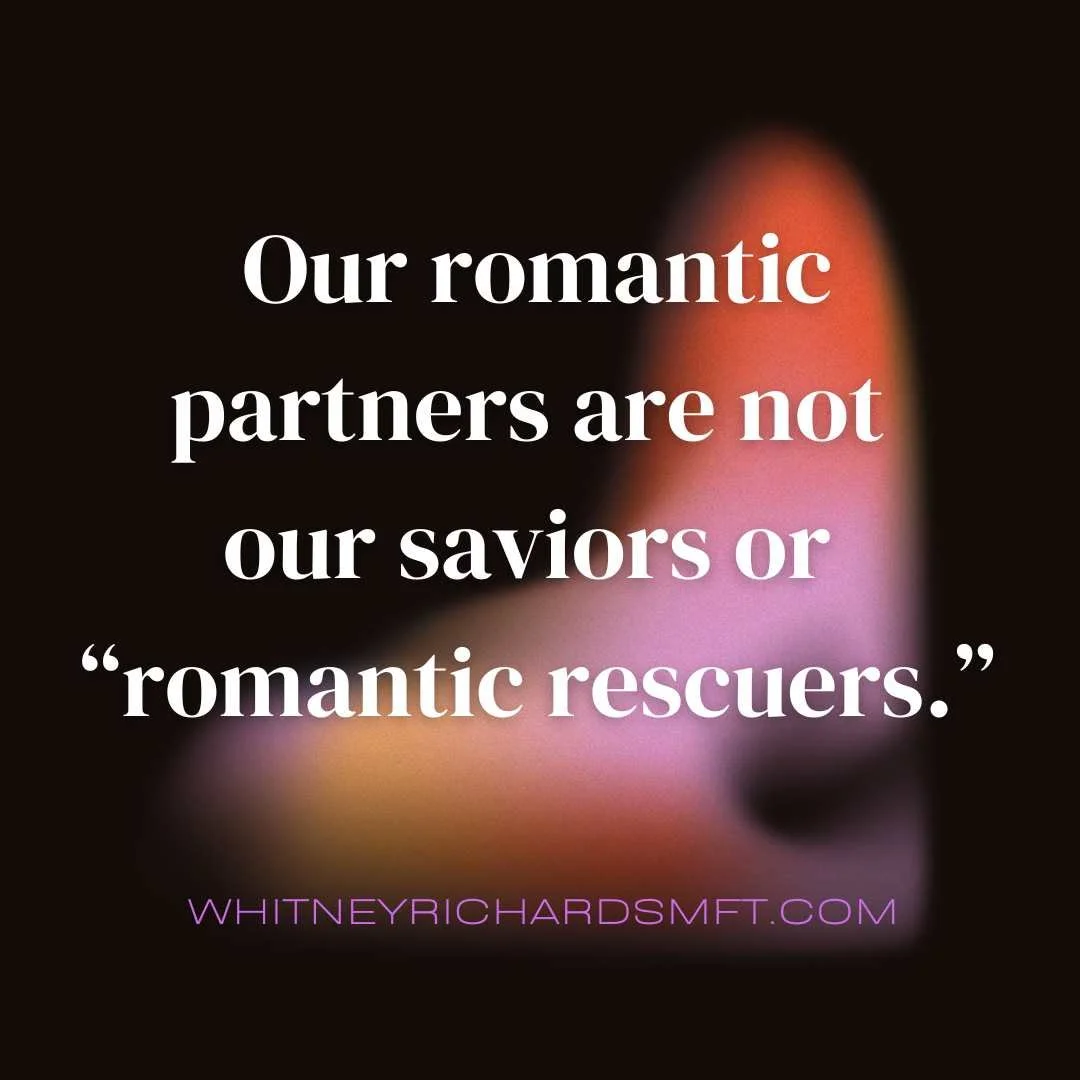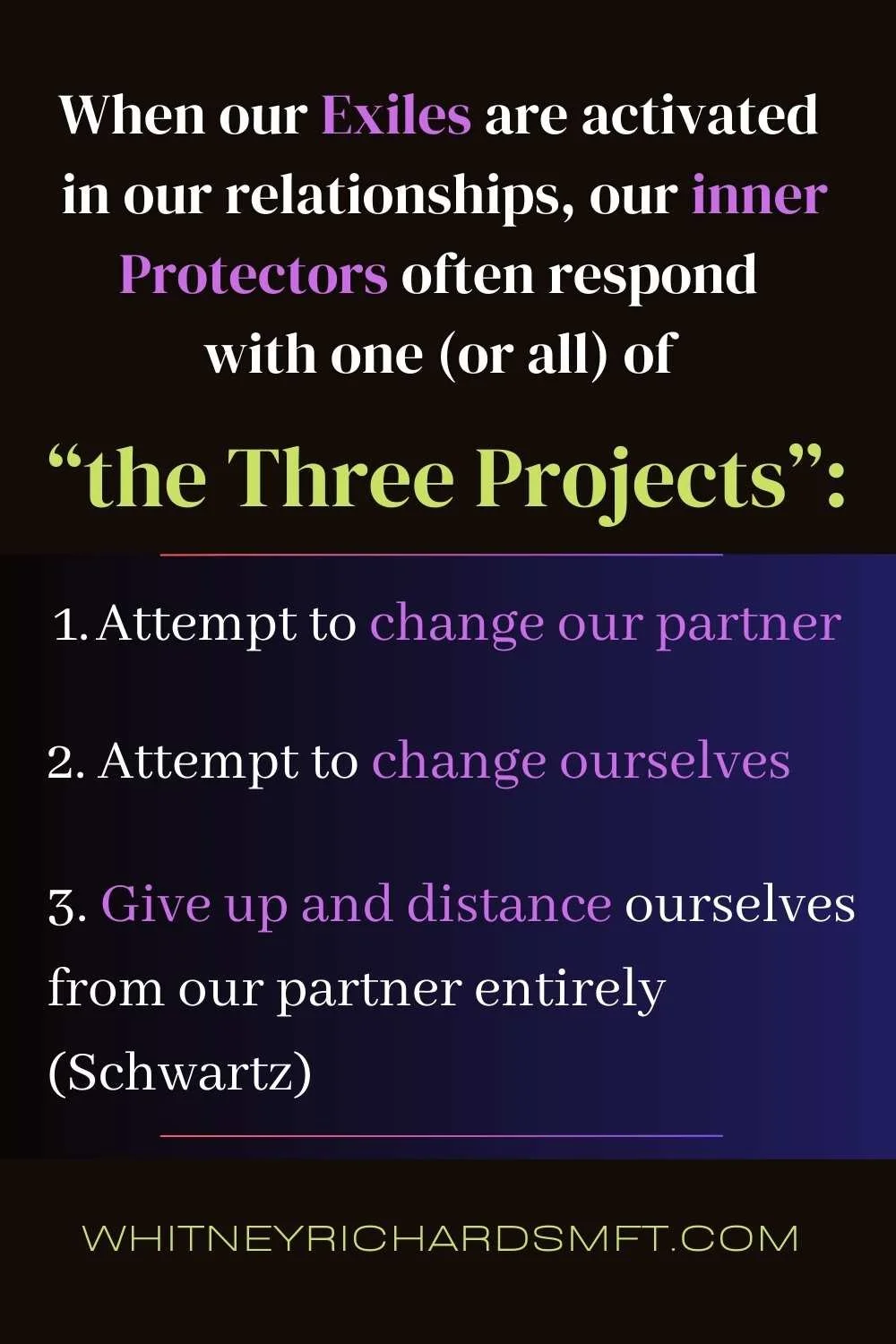Why We Struggle in Relationships: IFS Therapy San Francisco
In my practice as a therapist in San Francisco, many of my clients come to me with relationship issues with their partner. Most of us can agree that our most intimate partnerships often bring out our greatest insecurities, and you might find that the deeper your relationship gets, the more issues crop up between you, leaving you both feeling frustrated or even helpless.
Even though you love each other deeply, you might find that you and your partner are stuck in a cycle of hurtful behavior, argue constantly, or find it difficult to truly be on the same page emotionally, mentally, physically, and spiritually.
Especially if you struggle with trauma, anxiety, or low self-esteem, when it comes to your romantic partnerships you might struggle in ways that make you wonder, Why is this so difficult? What is stopping us from being able to connect? What is wrong with me?
Today, we’re going to dive into the answers to those questions (Hot tip: There’s nothing wrong with you!) using the framework of Internal Family Systems (IFS) therapy. Through the lens of this powerful therapeutic approach, we’ll tackle the biggest issues that crop up in romantic relationships and how they inform our struggles to connect, communicate, and empathize with each other.
If you’ve read my previous blogs, you’re already familiar with IFS – a therapeutic model founded and developed by Dr. Richard Schwartz. IFS proposes that our minds, personality, and inner world are composed of different “parts” that serve powerful roles in our life and affect our behavior, emotions, and worldview. If you aren’t yet familiar with this concept, check out my overview of IFS here, and a further breakdown of our inner “parts” here. Don’t worry – I’ll wait!
Alright – so you’ve learned about our Exiles and Protectors (Managers and Firefighters). But what exactly do our “parts” have to do with our loved ones? How do we apply IFS to identify our relationship problems?
Dr. Schwartz covers all of this and more in his book You Are the One You’ve Been Waiting For (Sounds True, 2023). The simple answer is: You aren’t just in a relationship with your partner – so are all of your “parts”. And those parts – primarily Exiles – often have a lot of big feelings and a lot to say about your relationship dynamic that affects how you both relate to each other.
In You Are the One You’ve Been Waiting For, Dr. Schwartz breaks down the key ways our Exiles - the parts of us that hold the heaviest burdens from our childhood, our deepest wounds and most tender vulnerability - affect our intimate relationships and inform the issues we struggle with the most.
Cultural Conditioning
We all bear the social and cultural impact of romantic paradigms that Western culture forces upon us as early as childhood. Throughout our lives, we are told that our romantic partners are our saviors or “romantic rescuers” - that we are empty without our “other half”, that our “soul mate” is what completes us. This messaging implies that romantic love is our salvation, and that external relationships - rather than the relationship we have with ourselves - is the answer to our heartache. These concepts push us to view our partner as our “redeemer”.
The problem with this messaging is that it places extreme pressure on our partner to be the primary caregiver of our inner “parts” - especially Exiles. Our partner is the one who should heal our Exiles’ wounds, and it’s our partner who’s the problem when they fail to meet our Exiles’ needs. This, inevitably, produces conflict as we mutually project our inner parts on each other, which can look like attributing a caregiver role to our partner, the pressure to heal each other, or projecting our unmet needs on our partner.
When both partners seek redemption from the other, we lose sight of our relationship with ourselves, placing unrealistic demands on each other and losing ourselves in the process.
The Power of Exiles
How do our Exiles hold such power in our relationships?
Exiles develop when, through early childhood experiences with our caretakers or traumatic experiences, we receive the message that vulnerability is dangerous or unacceptable. In You Are the One You’ve Been Waiting For, Schwartz identifies the three key reasons for how our vulnerable parts become exiled. This can happen when:
“Your vulnerability, in its natural, innocent state, bothered your caretakers or peers
Your natural vitality disturbed your caretakers or peers
Your vulnerable or lively parts were hurt, became extreme because of the hurt, and then triggered other people or disturbed you (Schwartz, 40-42).”
To avoid the suffering resulting from these experiences, we often learn to banish our most vulnerable and needy parts, because we now associate our vulnerability with pain and rejection. We bury these parts deep inside, where they develop extreme beliefs about relationships, love, and intimacy, often convinced we are unlovable with a deep sense of abandonment or worthlessness.
It’s no wonder, then, that our Exiles’ painful feelings and extreme core beliefs get triggered in adulthood by our most intimate and vulnerable connections - our romantic relationships. Our love-starved Exiles don’t want to be ignored, and since we’re the ones who banished them in the first place (for good reasons), it's no wonder that they desperately yearn for a partner to save us, to rescue us from our deepest pain - while also being afraid to be fully seen.
We all want relationships where we get our needs met and where we feel safe to be vulnerable. But when our Exiles are activated by anxiety or feelings of abandonment, we often end up getting trapped in a cycle of triggering each other’s most vulnerable pain points, making it extremely difficult to truly connect.
The Three Projects
What does it look like when our Exiles are triggered by our partner?
When our Exiles are activated in our relationships, our inner Protectors often respond with one (or all) of what Schwartz calls “the Three Projects”:
Attempt to change our partner
Attempt to change ourselves
Give up and distance ourselves from our partner entirely (Schwartz, 4-5)
Because we’ve been told that a romantic partner holds the key to fixing our enduring pain or emptiness, and that messaging has been confirmed by our Exiles, we become attached to our partner for survival and our Protectors go to great lengths to avoid being triggered.
This can look like constant criticism or controlling behavior in attempts to mold our partner into what we feel we need them to be in order to feel safe. It can look like jealousy or possessiveness in attempts to keep our partner from abandoning us. In efforts to become what our partner wants, we might develop resentment and become defensive when we feel we’ll never be accepted. Or, once our desperate attempts fail to make us feel whole and accepted, we become cold and distant, uninterested and uncommunicative. These “Three Projects” all pose major obstacles to a healthy relationship dynamic.
Neo-Exiles
In You Are the One You’ve Been Waiting For, Schwartz identifies another set of parts that can have severe consequences on your relationship, which he calls “neo-exiles”. Different from the Exiles that developed in childhood, these parts develop later in life in response to unmet needs and other relational challenges in our intimate partnerships. These parts are rooted in abandonment anxiety, and can cause patterns of over-dependence, blame, and withdrawal when feeling frightened or challenged.
Neo-exiles are often focused on eliminating the parts of our partner they feel threatened by. Ironically, these parts may have initially been what attracted you to your partner - for example, your spouse’s outgoing and friendly personality was attractive to you initially, and you loved how brightly they shined around other people. But, once you experience conflict or feel abandoned or neglected by your spouse, these qualities that you once appreciated are now seen as threats to your security. That charming personality? No doubt they’ll attract someone they like more than you and leave. Their curiosity about other people? No doubt that means they’ll cheat on you eventually. In response to these claims, your partner may feel like their outgoing and charming personality needs to be banished in order to be accepted in the relationship.
It’s a painful cycle for both partners (and their neo-exiles). They’ve been exiled through our attempts to be an “un-abandonable” partner, leaving us feeling like we aren’t accepted for who we are. Our attempts to “tame” our partner by whittling away the parts of them that stoke our fear of abandonment only lead to more conflict.
Navigating Relationships From a Self-led Place
These obstacles in our relationships can feel insurmountable. It’s understandable to feel hopeless when both you and your partner struggle to be truly vulnerable with each other, or when no matter what you try, you can’t seem to disrupt the cycle of triggering each others’ Exiles. So what do we do about it? How can you and your partner come to feel safe with each other, and to develop healthy patterns of relating that honor both you and your scared, vulnerable parts that yearn to feel worthy of love?
In my previous blog, we discussed our core “Self” - the pure, undamaged essence within each of us that is able to observe our inner parts and orchestrate inner harmony. We also learned about “blending” - what happens when our Self is merged with our parts. Like I said earlier, your inner parts and your partner’s inner parts are in relationship with each other. This relationship can be full of strife or even hit a dead end if each partner does not “un-blend” or have an awareness of when their parts are activated and whether they’re tapping into Self energy.
I shared in my blog what it means to be “Self-led” and what it looks like to “un-blend”, processes which involve building trust with our inner parts. We can do the same thing in our relationships - even though it looks a little different.
Stay tuned for my next blog, where we’ll explore how to use IFS to navigate the problems we’ve discussed, and what both you and your partner can do to truly, authentically connect.
A free therapy consultation in San Francisco
If you’re looking for IFS therapy in San Francisco, feel welcome to call me at (415) 851-5125 for a free 15-minute phone consultation. My specialties include anxiety, self-esteem, and relationship wellness.



